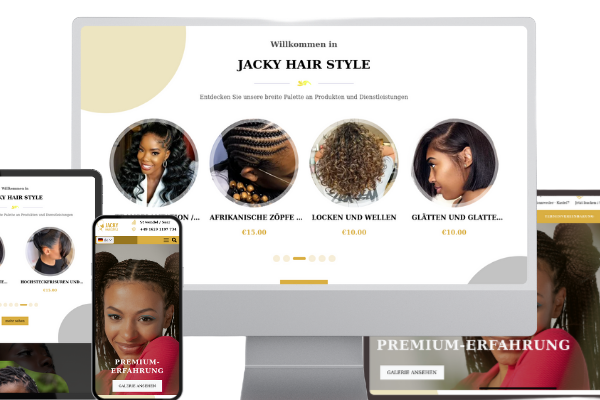In today's economy, the first encounter with a potential customer rarely happens over a cup of coffee. It happens online, often in less than five seconds. For your prospects, your website is not just a showcase: it is the embodiment of your professionalism, ambition, and reliability.
The good news? You don't need a multinational budget to project the image of a large company. By focusing on a few strategic levers related to professional design and user experience (UX), your SME or microbusiness can instantly inspire confidence and position itself as a key player in your market.
Here are the essential pillars for transforming your platform and boosting your online credibility.
1. Design: the foundation of professionalism
Aesthetics are the number one factor influencing how your company is perceived.
A. Consistent and polished visual identity
Big brands are instantly recognizable. For them, web graphic design isn't an option, it's a golden rule.
- Strict consistency: The logo, colors, and typography must be the same on all pages, as well as on your social media accounts, quotes, and business cards. This consistency is the foundation of brand identity.
- Clean aesthetics: Forget flashy effects, garish colors, and useless widgets. Opt for a professional (often minimalist) design with plenty of white space (negative space). This conveys a sense of order, clarity, and control, qualities associated with mature companies.
B. Visual quality (High-resolution images)
Nothing betrays amateurism faster than pixelated images or poorly integrated generic stock photos.
Invest in:
- High-resolution professional photos.
- Authentic photographs of your products, teams, or premises. Authenticity, even on a small scale, inspires much more confidence than artificiality.
2. User experience (UX): efficiency above all else
Large companies offer smooth, seamless experiences. Your website should do the same.
A. Website loading speed
A slow website is perceived as neglected and unreliable. In the mind of the visitor, if you can't optimize your own platform, how can you manage their projects?
- Optimization: Make sure your site loads in less than 3 seconds. For SEO, this is a crucial ranking factor.
B. Intuitive and responsive navigation
Visitors should be able to find information in two clicks or less.
- Clear structure: Use a simple and logical main menu. Your intuitive site navigation should guide the user.
- Mobile compatibility: Your site must be 100% responsive. Today, a site that does not display correctly on mobile devices is considered archaic. Mobile SEO is also Google's standard.
C. Clear calls to action (CTAs)
Large companies don't waste time. They tell you exactly what they want from you. Use clear and powerful buttons: Request a Quote, Contact an Expert, Download the Guide.
3. Content: building trust and expertise
Content is your best tool for establishing your legitimacy.
A. An “About” page that inspires ambition
Don't just say what you do. Explain why you do it.
- Your Mission: Clearly present your company mission and values. This gives weight and depth to your organization.
- The Team: If possible, humanize your organization by introducing the team (even if it's small) with professional titles.
B. Irrefutable social proof
Social proof is the foundation of online credibility. Customers of large companies are always willing to testify. Do the same.
- Testimonials and Logos: Include detailed customer testimonials on your website. Display the logos of your customers or partners if you have their permission.
- Case Studies: Write case studies that demonstrate how you have solved complex problems. This proves your business expertise.
C. A blog to position yourself as an expert
An SEO-optimized company blog shows that you are a thought leader, not just a service provider.
- Regularly publish articles that answer your customers' questions and highlight your expertise. It's the ultimate tool for positioning yourself as an expert.
4. The details that make the difference
Finally, large companies leave nothing to chance. Here are the “small” details that strengthen your image:
- HTTPS security: An active SSL (HTTPS) certificate on your site is a prerequisite for digital trust; it reassures visitors that their data is protected.
- Legal notices and Terms and Conditions: Easily accessible legal notices and Terms and Conditions of Sale (T&Cs) show that you operate with complete transparency and legality.
- Accessibility: Easily identifiable customer support (phone, email, chat) shows that you are available and organized.
The impression of a large company is not a question of size, but a question of intention, investment, and execution. By focusing on professional design, optimizing the user experience, and building a solid content strategy, your website will become a powerful lever for trust and growth.
👉 Ready to give your digital image a professional makeover?
Contact Habeuk for a comprehensive website audit and find out how we can help you build the platform that reflects your company's ambition.




